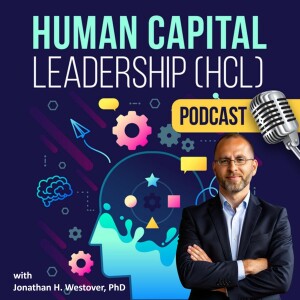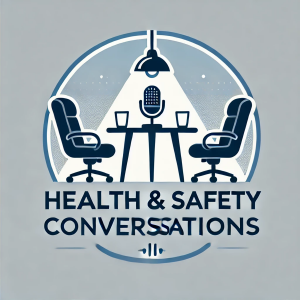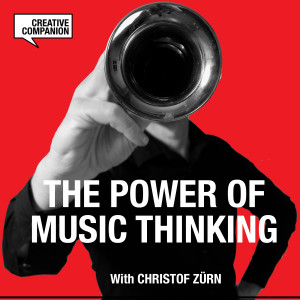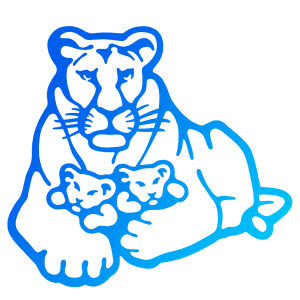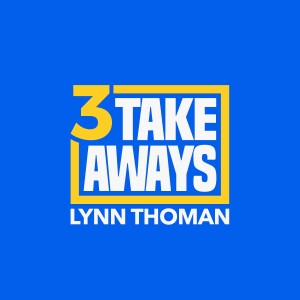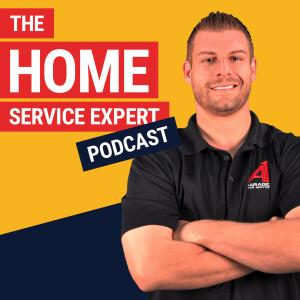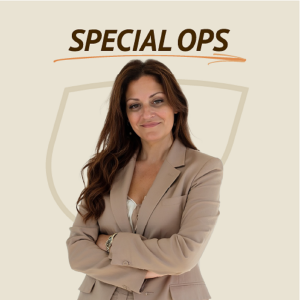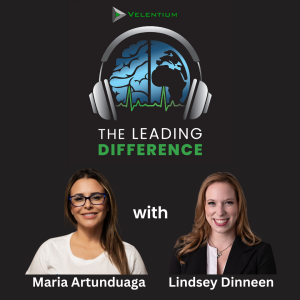

Maria Artunduaga | Founder & CEO, Samay | Innovating COPD Detection, Leading with Legacy, & Perseverance
Maria Artunduaga is the founder & CEO of Samay, the winner of the 2024 MedTech Innovator accelerator, as well as a groundbreaking physician, scientist, and inventor. Maria discusses her inspiring journey from a small town in Columbia to leading a top MedTech company in the US. After pivoting away from plastic surgery training, she channeled her efforts into creating Sylvee, an AI wearable sensor for COPD patients. Maria shares her relentless determination, innovative problem-solving strategies, and the creation of a company culture that emphasizes learning and diversity.
Guest links: https://www.samayhealth.com/home | https://www.linkedin.com/in/drartunduaga/
Charity supported: ASPCA
Interested in being a guest on the show or have feedback to share? Email us at theleadingdifference@velentium.com.
PRODUCTION CREDITS
Host: Lindsey Dinneen
Editing: Marketing Wise
Producer: Velentium
EPISODE TRANSCRIPT
Episode 057 - Maria Artunduaga
[00:00:00] Lindsey Dinneen: Hi, I'm Lindsey and I'm talking with MedTech industry leaders on how they change lives for a better world.
[00:00:09] Diane Bouis: The inventions and technologies are fascinating and so are the people who work with them.
[00:00:15] Frank Jaskulke: There was a period of time where I realized, fundamentally, my job was to go hang out with really smart people that are saving lives and then do work that would help them save more lives.
[00:00:28] Diane Bouis: I got into the business to save lives and it is incredibly motivating to work with people who are in that same business, saving or improving lives.
[00:00:38] Duane Mancini: What better industry than where I get to wake up every day and just save people's lives.
[00:00:42] Lindsey Dinneen: These are extraordinary people doing extraordinary work, and this is The Leading Difference.
Hello, and welcome back to another episode of The Leading Difference podcast. I'm your host Lindsey, and I am delighted to welcome as my guest today, Maria Artunduaga. Maria is a physician, scientist, and inventor with 60 plus prizes, including becoming the first woman to lead a US LATAM company to win MedTech Innovator, the world's most competitive accelerator for medical technology surpassing over 1300 global companies. A top 1% student in Columbia, her country of birth, she relocated to the US to pursue plastic surgery training, but abandoned it to dedicate herself to solve the problem that killed her grandmother-- a lack of home technologies that can detect COPD exasperations early. Maria has raised 5.2 million, almost 60% in non-dilutive capital from NSF and NIH to build Sylvee, an AI wearable sensor that can provide COPD patients with continuous data on pulmonary functions similar to what continuous glucose monitoring sensors do for diabetic patients.
Her invention has been featured by a hundred plus media outlets, including Forbes, TechCrunch, Bloomberg, Fierce Healthcare, and more. Before Samay, Maria completed postdoctoral studies in human genetics at Harvard Medical School, started a plastic surgery residency at the University of Chicago, and completed two master's degrees, one in global public health at the University of Washington, and another in translational medicine at the University of California at Berkeley and San Francisco. She lives in Mountain View, California with her husband, 2-year-old daughter, and four pets. In her free time, she enjoys flamenco dancing, bolero singing, traveling the world, and fostering diversity in and outside the workplace by mentoring underrepresented scientists and entrepreneurs.
All right. Well, thank you so much for being here, Maria. I'm so excited to finally get a chance to speak with you. I'd love if you would share a little bit about your background and your career trajectory. What led you to MedTech?
[00:02:40] Maria Artunduaga: Sure. So it's gonna be a little long and I'm gonna tell you everything about my life because the personal history is very important to me and for my company too. So, as you have noticed, I have an accent. So, I grew up in Columbia in a very small town in the southern part of the country. My parents were both doctors and I'm the oldest of four kids and two of us followed their lead. So my life in my city was pretty chill. Everyone knew everyone. I spent most of my days at a Catholic school studying very hard on weekends where I usually spent tagging along my parents to doctor events.
One of the things that I really like to tell, it's how my parents work as entrepreneurs really shaped my life. They were real pioneers. They built in my hometown the first big clinic back in the eighties and the nineties. And my mom was the only woman in that group, and she actually was the CEO for a while, which was a big deal. She was the only woman in a partnership of 10 people. And watching them build that clinic, that hospital really taught me a lot about dealing with uncertainty and finding solutions. Every day we'll have supper or lunch and I'll just hear all of these challenges and stories, their struggles and how they solve things. Something that was, that is definitely super helpful in what I do now, right?
So, and then I was 16 and after high school I moved to Bogota, the capital, which is up in the mountains, it's very cold. I got a scholarship 'cause I was always a very good student. You know, career I spent my last year, I spent nine months in the US. Honestly, coming to the US blew my mind. The technology that I got to see, the speed, effects on science, it was nothing like I've ever seen before, and that was true inspiration for me. So I knew that I had to come to the US. I needed to come back to learn from the best, of course.
And it's interesting because my parents didn't want me to relocate to the US. I was the oldest. I was supposed to follow into their footsteps and obviously, like inherited that clinic, right? That hospital, we call it clinic, it's actually a hospital. And I was a very contrarian. I didn't listen to them. I told them, you know, I really wanna be where the best people are. And what I did was that I, it took me three years to save the money to come to the US, to get Harvard to actually sponsor me my visa because they wouldn't pay me for the first year. So I remember I had to save $30,000, which in pesos is significant.
So back in 2007, so many years ago, I made it to Boston, and the original idea was that I wanted to become a pediatric plastic surgeon and bring that level of care back to Columbia. I spent four years of researching a genetic ear condition that's called microtia. And with that work, I was able to land a plastic surgery residency spot or position at the University of Chicago. And I shared this with a lot of people. I actually had a really negative experience. Things didn't go as planned. I actually faced discrimination. I eventually, you know, had to leave and I made the top choice to never ever go back into clinical practice.
And I changed paths. I was 32 years old and yeah I decided to switch gears. I retrained into public health and tech. And then in 2016, I moved to the Bay Area where I am right now. And I got another scholarship to finish master's in translational medicine at UC Berkeley and UCSF. And during the courses that I took, some of them with business class etc., etc., I decided to found Samay in 2018. I really wanted to build something that would really make a difference in respiratory medicine.
And this is where my grandmother comes. So my, the grandmother, my abuela, her name was Sylvia and she had Chronic Obstruct Pulmonary Disease or COPD and she's the reason behind my company. So, she often couldn't tell when her symptoms were getting worse. That's a huge problem. Catching the respiratory attacks, exacerbations is definitely key to keeping people outside of the hospitals, and obviously feeling their best to have a better quality of life. So, that's what we are trying to solve with a company, right?
If we are able to catch those exacerbations even with a day or two notice in advance, right, that we can all make a difference. And so by missing these exacerbations, we are having really high expenses in hospitalizations and ER visits and the problem we trying to solve is that today technologies that are adequate enough to be used outside of the hospital because the ones that are considered to be the gold standard, they are very expensive. They are confined to their hospitals and they are very difficult to complete for the patient, especially when they're exacerbating. They need to blow out forcefully for about 10 seconds, 21 times.
So what we are doing is, we are developing a sensor that makes it super simple for people to use it at home to track their lung function without doing those forceful maneuvers and ideally in the future to warm them, right? Like to let them know when things are starting to go south or obviously, you know, not going very well, and that's what it's all about. I mean, that's what we do with Sylvee right here. And it's wearable sensor and we have done significantly well over the past couple of years. We actually just won MedTech Innovator.
[00:08:04] Lindsey Dinneen: Yeah. Significantly well over the last few years. Yes. So congratulations on that, and I want to dive into all of those exciting milestones in just a second. But I am, first of all, so inspired by your story. Thank you for just sharing that your resilience and your grit and your determination are really admirable. So thank you for sticking with something that was not easy, not an easy path.
[00:08:29] Maria Artunduaga: I know. I know.
[00:08:31] Lindsey Dinneen: It continues not to be, ironically, as we've kind of touched on before, but just going backward a little bit in your story. So I, it sounds to me like getting the opportunity to watch your parents have this incredible impact on their community and the healthcare and the opportunity is just so valuable for you. And even just learning about how your mom was the CEO and those kinds of things, did that help shape the idea for you that not only is entrepreneurship possible, is innovation and healthcare possible, but you can also be this in incredible leader as a woman in whatever capacity? I would just love to dive into that.
[00:09:13] Maria Artunduaga: Yeah, it's super interesting, right? My mom really taught me a lot about leadership. She's a surgeon, so you can imagine how good of a leader she is in the operating room at home, everywhere, right? I mean, she's definitely the general, that's how I call her. And I honestly, I try to replicate, so my leadership and styles pretty much shaped by her. So I always call her my best role model whenever somebody asks me about the question, right? So I'm just like her. I lead from the front. I like setting the pace by working the hardest.
So I really like to lead by example and I also, just like she did, and obviously because of her surgical training, I hold myself to a really high standard, and I expect everyone on my team to do the same. So people in my company know that I'm very strict, I'm very disciplined, and they know that from the beginning. It's so funny because when I interview all of them, at the final interviews with me, and I actually do the anti sale to join Samay. It's like, this is, these are all the reasons why you shouldn't join. I start describing myself as a very intense, obsessed CEO with insomnia, which I still have, because I really wanna make this work, right?
So, yeah, I, ask them, and most of them say yes. I really like, I attract people that like challenges, especially intellectual challenges. So, yeah, to this point, most of them say yes. Some of them have obviously, you know, because probably too much. But at the same time, I tell them, "Look, this is going to be very hard in terms of the deliverables, the things that we're expecting from you." But at the same time, my goal is to not only help people with respiratory problems, I try to sell the company as a company where everyone that gets hired can be themselves and thrive.
So, so for example, I tell them," Look, I'm trying to be the boss that I never had." And this goes obviously very tied to the very negative experience that I had during my surgical residency and even before, right? So, I never had a boss that really supported me, who recognize my true self and those characteristics as good things, right? So they always try to tone me down. I'm very energetic, as you can notice, and I'm also super ambitious. I'm really ambitious. I wanna do all of these great things. And they always thought that I was aiming for too much, especially for a woman.
It's like, " You need to lean in, Maria. You need to behave." So I remember my residency, they were criticizing like, "Why are you behaving like this, Maria? Why are you asking so many questions? You're asking too many questions. You look more as an internal medicine doctor. Why are you always smiling, Maria? Why are you so happy?" So now, with everyone that I hire, what I try to do is that I focus on understanding their dreams and I try to figure out how this job is gonna help them get there.
So if they wanna become a top engineer, maybe they wanna learn managerial skills, or they wanna run operations, or they eventually wanna become a founder themselves. So I try to create a partnership with them where they obviously help me succeed with the company, build Samay, but at the same time they get to do this personal growth. So it's extremely important that they get to place where they wanna be.
[00:12:32] Lindsey Dinneen: Yeah, that's wonderful. And such a gift to your employees. And I also honestly, that sort of anti interview or whatever technique is brilliant because you do want it to be a fit for everyone, and it's so much better to have aligned expectations from the start. So, oh my goodness, that's so interesting. So, okay, so then. Speaking into that, how do you develop a company culture for yourself? You've learned from some pretty negative experiences, so obviously that's what not to do, but you know, as you're crafting your own company culture now, what kinds of things are sort of your core values, other than of course, your hard work and your excellence and holding yourself and others to high standards, but what kinds of things do have you developed that make it special to be where you are?
[00:13:19] Maria Artunduaga: Yeah, I mean, that's a really good question. I'm very true to myself, and one of the things that I wanna do with Samay, it's I wanna create legacy. If you go to my WhatsApp, that's exactly the little logo or the slogan that's below my name: I'm creating or building my life's legacy. That's how I pitch myself. So I really wanna be remembered as someone that made healthcare more accessible, especially for the people that get left behind.
So growing up in Columbia, I saw firsthand how unfair things will be and I wanted to change that. So that's how the values of Samay go, people first. I think legacy, it's extremely important, right? It's about getting those life changing tools and opportunities into the hands of people who really need them. And again, it's not necessarily, the group that we're building. It's the own experience of building a company with me, learning from the company, from the people that are working with. I really wanna make it accessible for people.
And I wanna also be obviously a source of inspiration. You don't necessarily need to be this perfect person to be a CEO. You know, life is a struggle and that's totally fine. Just be very passionate about building legacy, right, your work and how you're impacting other people. And especially for me, I do a lot of work with women and minorities. I really wanna empower them to chase their dreams in science and technology. I really care about people. I don't know, I'm selfless about me. It's all about the others and creating legacy and being remembered. So, yeah, that's how I, that's how I roll.
[00:14:59] Lindsey Dinneen: I love that. I love that. So speaking of you embracing the CEO role, when you first started your company, did you feel ready to step into this kind of position? Or was it something where you just were like, "You know what? I see the need. I know I can make a difference in this field. I'm gonna do it and I'll learn along the way."
[00:15:19] Maria Artunduaga: No, not at all. And let, so there's a very good anecdote that I'm sharing. Again, back to all of these life changing experiences. I got into medtech because of, I don't know, somehow the planets got aligned, right? So I was doing a master's in public health because I thought that was going to be my real call, working for Gates in Seattle, because that's where I actually lived for about two years. Then I came to realize that it was very bureaucratic. It's very, was very slow. I have a type A personality. I really like to fix things very quick. I like to implement stuff.
So I decided to do a second master's degree, and as I mentioned, here in Berkeley, I decided to join one of Atma METs minority programs for students, right? It's called SMDP. And I remember that was back in 2016, and they sent me to Minneapolis for the big conference. And that's where I got my first real taste of MedTech. And I remember watching the MedTech Innovator finals with Paul Grand. He was introducing the program, the finalist.
I remember clearly seeing all of his pitches and how Green Sun Medical CEO won, and it was a game changer to me because when I saw them pitch, it was very exciting. You know, all these technologies, the many millions of people they could definitely impact, I saw that, and it clicked. I could turn the scientific ideas into something that helps millions in a way, the way how I would practice medicine, but in a more impactful way.
So interesting story though. So the other thing that was very inspiring or at least that motivated me, I was the only person in the room who looked like me and spoke with an accent from South America, from Latin America. So it was like two reasons behind it. For me, it was I wanna be a medtech entrepreneur, but at the same time I wanna be able to break the glass ceiling, right? The first Latina physician CEO building a company that has hardware, software, and AI, this is what we actually do.
And yeah, so it, it's mainly that. I really like challenges and I'm very motivated to show people that I can do things that might seem impossible or too difficult. So I really like showing people that anything is possible with a lot of hard work and determination. So yeah, that's mainly it.
[00:17:47] Lindsey Dinneen: I love that. Embracing those challenges, running full steam at them and having that, I don't know, that gumption is fantastic too. And the desire, like...
[00:17:57] Maria Artunduaga: Thank you.
[00:17:57] Lindsey Dinneen: ...you said, to break through those ceilings and to represent and say, "No, it is possible." It is, and I love that. So, excellent. Okay, so can you share a little bit about the journey that the company has gone under recently and some of the really exciting milestones? I know there have been bumps and whatnot, but maybe some of the exciting things that have been developing and what you're looking forward to as you continue down the road.
[00:18:24] Maria Artunduaga: Sure. I mean, whew. There are so many things that have been happening for the last couple of months. So it's been a long journey. It's been six years so far. Initially, you know, I wanted to build a company with an idea that was inspired, obviously, by the fact that I lost my grandmother to exacerbation and also because, at the time, I didn't know what I wanted to build.
When I was doing an interview with a pulmonologist, what I realized was that I could actually build a technology that could be inspired by consumer devices, so hearing aids for example. And funny story is that my husband who is also Columbian, and went to MIT, he's been working at Google for over a decade and he's an auto engineer. He does a lot of things. He's very smart and he's one of the main architects.
What I decided to do back then was, let's repurpose hearing aid technology by sending signals through the chest, and let's use the physical principle of acoustic resonance to understand what's going on inside of the lungs. And that's exactly what we are doing. We have 10 granted patents so far. We have 20 more pending on pulmonary so far. So we've done a lot of things. So we've tested that device on 450 people almost. All of our numbers of accuracy are over 90. Sensitivities and specificities are also between 82 to 98. Right now we are starting to see changes a few days before an exacerbation is actually diagnosed by a physician, which is extremely exciting.
We have data from two people. Obviously it's a small sample size. We are following eight of them, and we're aiming to finish at 60 to hundred people in the next year or so. So that's our main goal. We've raised 5.2 million, 60% of that money is coming from grants, federal grants, and we just submitted a breakthrough designation to the FDA about a week ago, so fingers crossed, though, we get it right?
There are a lot of things in the pipeline, things that are very exciting. Right now I'm super excited 'cause those six years were very hard. I was running a science project with my nails, getting money from grants, help from people who have known me forever. It was very hard for me to recruit a full-time CTO. So my husband has been helping me with some hours here and there. And we have right now 12 people in Columbia. So for developers, designers, clinical researchers, we are running most of our operations in Latin America because it's extremely, well, obviously cost efficient, and more importantly, we have access to people that are patients especially that are, that exacerbate more often. So we are to leverage all the different angles that we can get.
[00:21:04] Lindsey Dinneen: Yeah. Wow. So lots of exciting things in the works and in the future, and oh my goodness, I'm so excited, can't wait to continue to celebrate all those wonderful accomplishments. So I'm curious, as you've taken this journey and even before with your other health experiences and finding this path, are there any moments all along the journey that really stand out to you as affirming, "Yes, I am in the right place at the right time, in the right industry."
[00:21:31] Maria Artunduaga: Yeah, beyond the MedTech Innovator, the experience eight years ago, I mean, every day I find that this is the perfect fit for me. I always tell people, "Look, entrepreneurship is not for everyone. It really needs to be a fit of personality." So when I talked to my parents, because at the beginning they weren't very agreeable with the idea of me becoming an entrepreneur 'cause physicians don't do this, right? I was sort of like a black sheep of a family, 'cause my sister, she's successful and she's a pediatric radiologist as she's working for an academic center in, in Dallas.
So, my personality, I'm Type A. I'm very anxious. I really like doing things super fast. I really like to get things done, right? So, I dunno if I picked the wrong career, probably could have done a better job as an engineer, as a scientist myself. So at heart, I'm a true scientist. That's what I really enjoy. I like practicing medicine, sort of miss it a little bit, but I'm more in the quest of solving questions and discovering, right?
That's what really excites me. And then, every day is a new day when you're building a company. And the challenges that I have every day, all of the problems I have to solve, I really enjoy the process of solving them. And this is a little crazy. Who gets excited with problems, right? So, I don't know, that's probably me. So I guess every day, the moment I go home or that I go to sleep, I say, "This is perfect. I don't think I'll be as happy as I am right now if I had stayed medicine. I don't think so."
[00:23:10] Lindsey Dinneen: Wow. And that says a lot. And that just affirms to you on a daily basis, "Yeah. I am doing what I'm supposed to be doing. That's wonderful.
[00:23:17] Maria Artunduaga: Exactly. Right. It's like, yeah, I'm good at this thing. You know? I like solving problems. I got, I really enjoy the fires. I really like them. I's like, I don't know. I'm, yeah. I'm addicted to them.
[00:23:30] Lindsey Dinneen: I love that. Well, and that is unusual, and I'm curious, do you? But it's a great thing. No, it's a wonderful thing. Yeah, no, absolutely. I love that. So, so when you're at finding yourself up against a problem, do you start with any particular kind of established framework? Do you like to just brainstorm solutions? How do you approach problem solving?
[00:23:53] Maria Artunduaga: Gosh, this is a really good question. It's like, you know, if I had to teach something, right? So I'm very good at solving problems, at connecting different disciplines, right, to solve those issues. So for example, the way how I go about them, first of all, I don't get frustrated or too anxious about it. I always try to think first, right? And then, yeah, I start brainstorming. I'm very quick at thinking, my mind goes super quick.
I have a whiteboard right behind me. I do a lot brainstorming on my own. I ask a lot of questions too. So I rely on a lot of people, and I get a lot of feedback on the way, how I think a problem needs to be solved. And obviously with time and experience, the older that you get, the better you become, right? So yeah, honestly, every problem is different. I just like seeing it from different angles, right? I'm very good with social stuff. I'm very good with arts too. I really like doing science, learning a about engineering. I really like different ways of solving problems.
For example, I remember that I we had this NIH grant and we were working collaboration with a big, famous academic center right here. And things weren't working very well. That was through during a pandemic and I was getting charged things that we actually didn't approve. So things were getting a little awkward. I decided to finalize that agreement. But then I got through this situation that I had no access to patients here in the States, and at the time, I didn't have my clinical site in Columbia opened up.
So what I did was the craziest thing, which is what I did, was that I bought an $80,000 machine and I came into an agreement with a friend from medical school who has a pulmonary practice in South Florida, one of the largest pulmonary practices. He's a partner with nine other guys, and they see probably a hundred patients every day. Can you imagine that? So respiratory patients, and I told him, "Look, I don't have any money to pay your rent, but I'm gonna give you equity for that rent, and you're gonna use this machine from Monday through Thursday, and I'm going to test your patients from Friday to Saturday. And I'm going to bring people, I'm going to become my own CRO, right? So I'm gonna bring people, doctors, from Columbia on a J1 visa as a research scholar visa. I'm gonna train them and I'm gonna get them to do the recruitment, review everything, test the patients. We are going to become our own CROs, and we are going to do as many people as we can every single week."
So we were able to do 430 people in a span of a probably a year and a half. Something that usually would cost us thousands of dollars. I dunno how much money I spend, probably just 300,000 to do everything. Can you imagine? I mean, that's significantly cheap compared to any other quote that I've been getting from an academic center. So, I sometimes go for the crazy idea, right? Like, what's the craziest thing that I could think of? I literally, I write it down, right? And then I just try to double check with my lawyer. "Am I doing something illegal here?"
And I, yeah, I cross reference with other founders. " I'm thinking of doing this, how that's that sound?" And they're like, "This is pretty non-traditional, Maria, but I mean, if you can get it done..." I'm like, "Yeah, of course I can get it done." And I just get it done. I just don't take a no for an answer. I'm very good at also finding, convincing people to jump on board with the vision, the mission. This excitement, this energy, people really get very engaged with Samay and with me as a founder, and they love it. Most of these people either have invested in the company, they are helping me many more hours, pro bono, literally free, and we are building together.
[00:27:43] Lindsey Dinneen: Wow, that is so cool. And what a fantastic story. Thank you for sharing that one as well. Oh my word.
[00:27:50] Maria Artunduaga: I have way too many stories to share. This is the one I really like to, to tell people.
[00:27:55] Lindsey Dinneen: I love that, and I love the willingness to come up with those crazy ideas. And it might be just so crazy that it works. So, hey, you never know until you try, and that's fantastic. Oh my gosh, I love that approach. Alright, so pivoting the conversation a little bit just for fun. Imagine you are to be offered a million dollars to teach a masterclass... I know! ...to teach a masterclass on anything you want. What would you choose to teach?
[00:28:22] Maria Artunduaga: Yeah. So, good question. So, gosh, I, I tackle problem. So my, my brain again is very good at figuring stuff out. That plus the fact that I'm very stubborn. So if I'm into something, I don't give up easily. And now I'm gonna tell the story about our winning MedTech Innovator. We beat 65 companies globally, right? And I still like, sort of, I cannot process that we won. So the story goes like this, but a year ago, I tried to raise five millions, my very first institutional round, and I totally flopped.
[00:28:55] Lindsey Dinneen: Oh.
[00:28:56] Maria Artunduaga: I only got $200,000 because multiple funds that I was talking to, they wanted me to feel half of the round before weighing any money or signing anything. So you can imagine. So do I got, you know, chicken or the egg problem? I failed. And instead of crying or mopping, I thought, "Okay, wait. I got into Medtech Innovator. You know what? I'm just gonna win that competition, still $350,000." And why not? So obviously people, my advisors, my best friend, "Like, you're crazy. It's the most competitive thing ever. You're not established in the field. People know who you are, but it's not like you have exited a company or anything, right? You're not even an engineer, Maria."
So what I did was, again I went back to my whiteboard. Again, I probably should have become an engineer before, I dunno. I'm really good at solving problems. So I was like, "You know, this is a problem. These are the different ways how I can tackle this." And more importantly, I'm very good at the studying stuff. I really like, again, knowing, wisdom, information. I just love that. I really love that.
So what I did was, I treat it like a big project, and I talked to the past winners, anyone who had done or won any sort of like prize with MedTech Innovator, and I figure out their secret sauce. So I either talk to them, I studied every single video, every single pitch. I spend many hours studying everyone who had one or had done significantly well throughout the accelerator. So what I discovered was the accelerator was kind of a school, like a school. So the harder you work, the better you do.
And one of the things that I realized was that mentors and reviewers were key players. So I focused on building those connections. I met with many of them. I probably spent about, I don't know, probably four to five hours meeting with mentors, anyone who I thought could help me somehow, obviously, for free, because a lot of the help that they give used for free. And I also spent a lot of time doing homework, the webinars, et cetera, et cetera. I ask a lot of people for advice. I really got people excited about Samay. I recruited my mentors and they got on board from day one.
Because of that, I started building those relationships and it was authentic. I mean, don't get me wrong, this wasn't like, you know, I'm trying to play anybody. I really care about what they had to say, and I incorporate all that feedback into my company to this day. So the other thing is, I make sure to go to everywhere, every webinar, every event, everything. My camera was always on, because most people, when they do their webinars, they don't even turn on their cameras, right? So I was very engaged. I was asking questions, I was getting involved with everything.
Same thing with the Slack channel that we have for MedTech Innovator. I was helping people, I was sharing stuff. I was even offering to make introductions. I really made sure that people knew who I was. And I obviously also asked the MedTech Innovator people, the staff, for help, feedback, right? Am I doing this right? What do you think I should do? Anything that you can share with me that you think. I was very clear with them. I wanna go to the, I wanna get to the finals.
I told them, and I remember they telling me, "Oh, Maria, about getting to the finals, it's so hard. It depends on the strategics and the sponsors." And I was like, " I'm gonna get there. What do you think I should do?" So I literally ask a lot of people how I needed to get there. And with the finals, the way how they pick the finalist, it's actually the mentors who go in front of the strategics, and they sort of champion your company. And they really went to bat for us. They told them how committed I was, the many people that from my team were actually going for participating to the winner because I brought people from my team...
[00:32:45] Lindsey Dinneen: Yeah.
[00:32:46] Maria Artunduaga: You know, very few founders did that. I brought people from Colombia, obviously online, people who barely could understand English. But, I made them prepare questions. "You need to do this and that we need to be super engaged. We need to help other people." And they saw it was hard work. And at the end, we got into the finals and what I realized was, okay, so after the finals, I understood that the game was, obviously it changed. The way how the winner is chosen is that the audience votes, right, during The MedTech Conference.
So what I did was, I went all in on social media. We made an awesome video for the best video competition. I remember that that was the first thing that I did back in June. I scheduled two weeks. I flew to Columbia. I hired right people. I made sure that I was perfect, so I was part of the creative team. I designed everything. Again, I really like arts, right? That's why, one of the reasons why I didn't, I was in pleasantry and that's why I really like dancing too, right? So I'm obsessive with everything that we do. I really am into the details and I supervise everything. And we also got into the finals for the best video competition.
So I was going to this problem from every single angle. I didn't let anything up to chance. I, yeah, I'm a freak. I'm a control freak. That's what I did. I remember that even for the pitch, the four and a half minute pitch, I practiced, I don't know how many hours, but every single thing that I say that was obviously memorized, needed to be perfect. The way how I, let's go back to dancing since you're a dancer yourself, the way how I moved my hands, right? The way, how I walked on that stage, everything was rehearsed. So, yeah, I mean, I just I worked my ass off. I mean, everything was the way it needed to be and that's how we won.
[00:34:39] Lindsey Dinneen: Yeah. Wow. That's great. What a fantastic story. Yeah. Amazing. Yes. I love how it's so choreographed. Yeah, that's
[00:34:48] Maria Artunduaga: great.
It was choreographed,
[00:34:50] Lindsey Dinneen: I love that. Excellent. Well, I know you have touched on the importance of legacy and how much that means to you, but how do you wish to be remembered after you leave this world?
[00:35:03] Maria Artunduaga: Oh gosh. Yeah. I mean, so I have a little daughter, I want to some somehow replicate the same experience that I had with my mom. Maybe she doesn't even realize how much of the inspiration and the impact that she had on me. And again, leading by example, I don't spend a lot of hours with my daughter, right? I have a nanny for 12 hours. So my salary goes to her payment, right?
Yeah, I wanna be remembered as somebody who tried very hard, who literally, instead of saying things, I walked the talk. The things that I said I was going to say. For example, I'm very opinionated with anything diversity and inclusion because, as I've said, I've experienced discrimination myself. So I walk the talk, I build a product, I build the change. I worked really hard. I impacted a lot of people.
And more importantly, the world has changed somehow because I existed. So that's that. It's as simple as that. I wanna help other people get to fulfillment of their lives and their dreams. And yeah, and I obviously wanna be happy while I do all of these things. And more importantly, I wanna feel that I learned a lot. I really like learning. The process of learning every single day, learning a new thing makes me super happy. So if I don't learn something new, I consider day as, you know, as like a flop or something. So yeah, it's very simple. I'm actually a very simple person, I'm not that complicated.
[00:36:30] Lindsey Dinneen: Yeah. Okay. And then final question. What is one thing that makes you smile every time you see or think about it?
[00:36:39] Maria Artunduaga: Oh, cute. I mean, obviously my daughter. So I'm a mom. I'm 44, well, almost 45, and I had her at 42. So just thinking about her makes me smile every single time. She's a miracle baby. She's, you know, after four years of IVF, eight retrievals, it finally happened. I finally had her, and having her in my life has turned my world upside down in the best way. She's determined, and she's only three. She's diving into doing all sorts of things. She's doing gymnastics, she's building Legos, she's doing engineering stuff. I really like that "I can do anything attitude" and obviously I'm sort of like reinforcing her to do anything she wants to try.
So seeing her try all these new things, all this confidence that I, that she has. It's like, I don't know. I mean, that inspires me. That motivates me to be a better mom, a better CEO, and to do exactly the same thing with the people that I work with. So everyone in my company, I I tell them I'm a mom, right? So, remember that, and I try to do the same with them. It's like I tell them, what do you wanna do? What do you wanna learn this month? What do you need? Right? My work as a CEO is getting the resources and put out the fires. Just tell me, and this is your playground, so I'm trying to do exactly the same with my daughter too. But yeah, I'm very happy with her.
[00:38:07] Lindsey Dinneen: Aw, that's wonderful. I'm so glad. Well, oh my goodness, this conversation has been amazing. I kind of wish it didn't have to end, but I also wanna respect your time 'cause obviously you have so much going on. But thank you so much for sharing about your story, your advice. You're so inspiring, and I know this is gonna inspire so many people to go for it, and not to have the fear, to have that problem solving mentality, and growth mindset and learning and, hey, look where curiosity got you.
[00:38:37] Maria Artunduaga: Yeah, exactly. That's a perfect slogan. It's all about that curiosity and it gets you places. Look at me.
[00:38:43] Lindsey Dinneen: Yeah, exactly. Yeah. And this is just the start.
[00:38:47] Maria Artunduaga: Yes, of course.
[00:38:48] Lindsey Dinneen: Indeed. So I just wanna say thank you again for your time today, and we just wish you the most continued success as you work to change lives for a better world.
[00:38:58] Maria Artunduaga: Thank you so much and thank you again for invitation. I really enjoyed it.
[00:39:02] Lindsey Dinneen: Yeah, absolutely. Me too. And we are honored to be making a donation on your behalf as a thank you for your time today to the American Society for the Prevention of Cruelty to Animals, which is dedicated to preventing animal cruelty in the United States. We really appreciate you choosing that organization to support and thank you just again, so very much for your time here today. Yeah, and holy cannoli, thank you so much to our listeners for tuning in, and if you're feeling as inspired as I am right now, I'd love it if you'd share this episode with a colleague or two, and we'll catch you next time.
[00:39:44] Ben Trombold: The Leading Difference is brought to you by Velentium. Velentium is a full-service CDMO with 100% in-house capability to design, develop, and manufacture medical devices from class two wearables to class three active implantable medical devices. Velentium specializes in active implantables, leads, programmers, and accessories across a wide range of indications, such as neuromodulation, deep brain stimulation, cardiac management, and diabetes management. Velentium's core competencies include electrical, firmware, and mechanical design, mobile apps, embedded cybersecurity, human factors and usability, automated test systems, systems engineering, and contract manufacturing. Velentium works with clients worldwide, from startups seeking funding to established Fortune 100 companies. Visit velentium.com to explore your next step in medical device development.
More Episodes
All Episodes>>Create Your Podcast In Minutes
- Full-featured podcast site
- Unlimited storage and bandwidth
- Comprehensive podcast stats
- Distribute to Apple Podcasts, Spotify, and more
- Make money with your podcast

